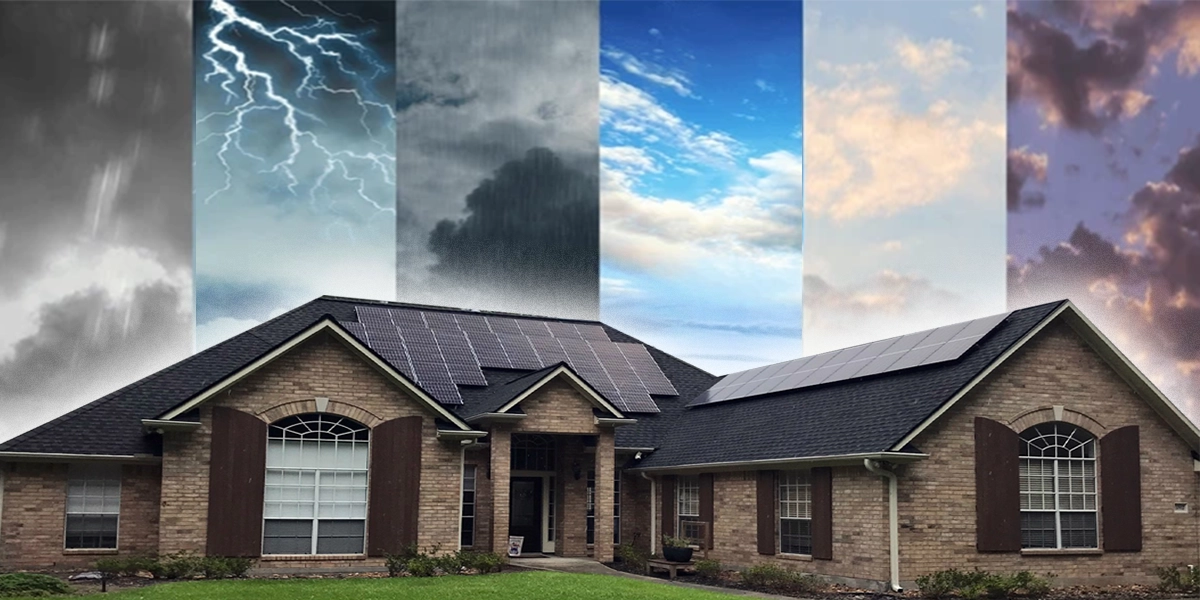- Updated On: Oct 24, 2024
Solar Panel Fires: Protect Your Home
from Potential Risks?
The amount of sunlight that strikes the earth’s surface in an hour and a half is enough to handle the entire world’s energy consumption for a year. In recent years, the adoption of solar energy has soared as individuals and businesses seek cleaner and more sustainable power sources. Solar panels have become a common sight on rooftops across the globe. While solar energy offers many environmental and economic benefits, it is essential to recognize and address potential risks associated with solar panel fires.
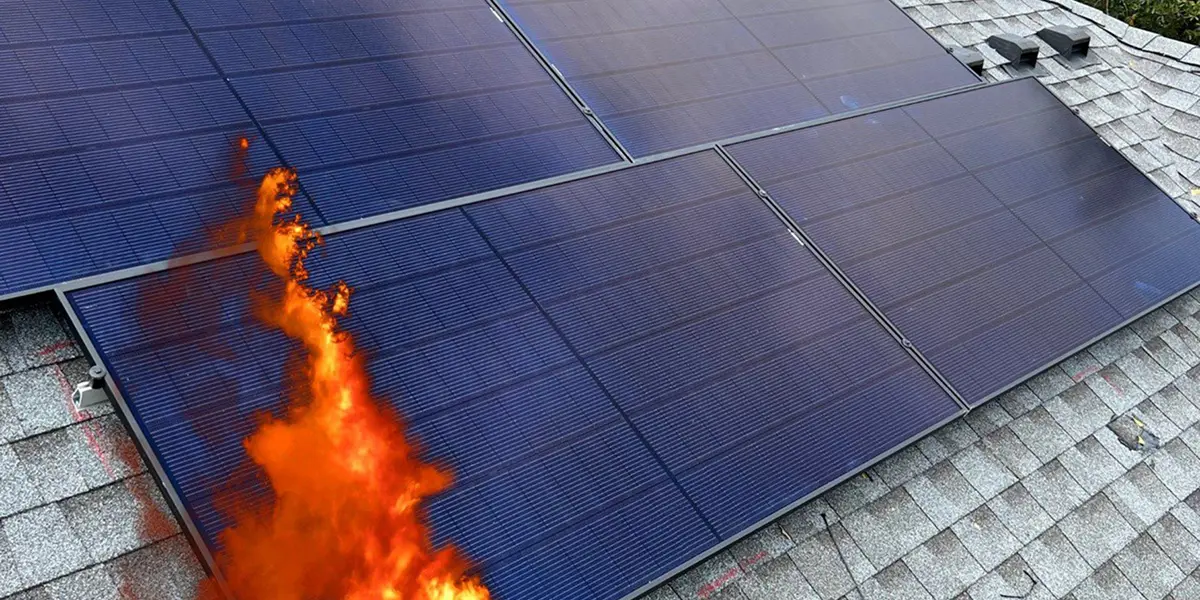
In the post-pandemic era, more people are working remotely now than ever. There has been a rising trend in the use of solar energy, as thousands of people rush to avoid rising power bills. Currently, solar is the most effective way to reduce your carbon footprint and your electric bills. With over 2 million installations in the entire U.S., there has been growing concern over solar panel fires. In this article, we will delve deeper into the causes of solar panel fires, explore preventive measures, and discuss key considerations to ensure the safety of your solar installation.
Can solar panels catch on fire?
Solar panels do not commonly cause fires. However, under certain circumstances, solar panels can contribute to fire incidents. The primary cause of solar panel fires is related to electrical malfunctions, external factors, or poor installation and maintenance practices. It is important to note that when people start to follow safety guidelines, the risk of solar panel fires gets relatively low.
Electrical malfunctions within the solar panel system, such as faulty components or improper installation, can generate heat which eventually leads to fire risks. However, reputable solar panel manufacturers and professional installers like Solar SME adhere to strict quality standards and safety measures in order to minimize these risks.
External factors like severe weather events, falling objects, or accidents can cause physical damage to solar panels. This can cause subsequent fires in solar PV modules.
Solar Panel Fires are on the Rise:
In recent years, there has been an alarming increase in solar panel fires, with several incidents reported in New South Wales (NSW). Last year alone, firefighters responded to 139 solar panel fires across the state and in January of this year, 18 fires have already been reported.
One of the primary causes of these fires is known as a DC arc. These fires occur when high-voltage DC flows between two conductors. The heat generated by a DC arc can be intense enough to ignite the surrounding material, leading to a fire. Solar systems that utilize high-voltage DC power require careful monitoring of arc faults, as they pose a significant fire risk.
Even the equipment failures such as damaged cables or loose electrical connections can trigger an arc fault. Once initiated, an arc fault can be challenging to stop, as the voltage in DC systems remains constant. Interrupting the circuit is the only way to stop the arcing but failure can result in the continued propagation of the arc.
In solar systems, a faulty DC isolator is often the site where a DC arc fault can occur. The DC isolator is a switch installed in solar systems that allow firefighters to deactivate the system in case of a fire. However, standard solar systems typically lack a Rapid Shutdown function. Ironically, it is often the safety switch itself, the DC isolator, that becomes the source of the fire.
How to mitigate the risks of DC Arc faults?
Incidents like DC arc highlight the importance of implementing robust safety measures during solar panel installations. Regular inspection and maintenance of the system are crucial in preventing arc faults. Furthermore, advancements in solar technology, such as the incorporation of Rapid Shutdown functionality and enhanced safety features in DC isolators, are beneficial to mitigate the risks of DC arc faults.
DC arc can only occur above 80 volts. The best way to reduce this issue is to install micro-inverters and DC optimizers in your solar system. Moreover, solar system owners, installers, and firefighters must stay aware of these fire risks and should work together to implement safety protocols. By addressing the issues related to DC arc faults and improving the overall safety of solar installations, the occurrence of solar panel fires can be significantly reduced.
Causes of Solar Panel Fires:
Various factors can cause solar panel fires, including:
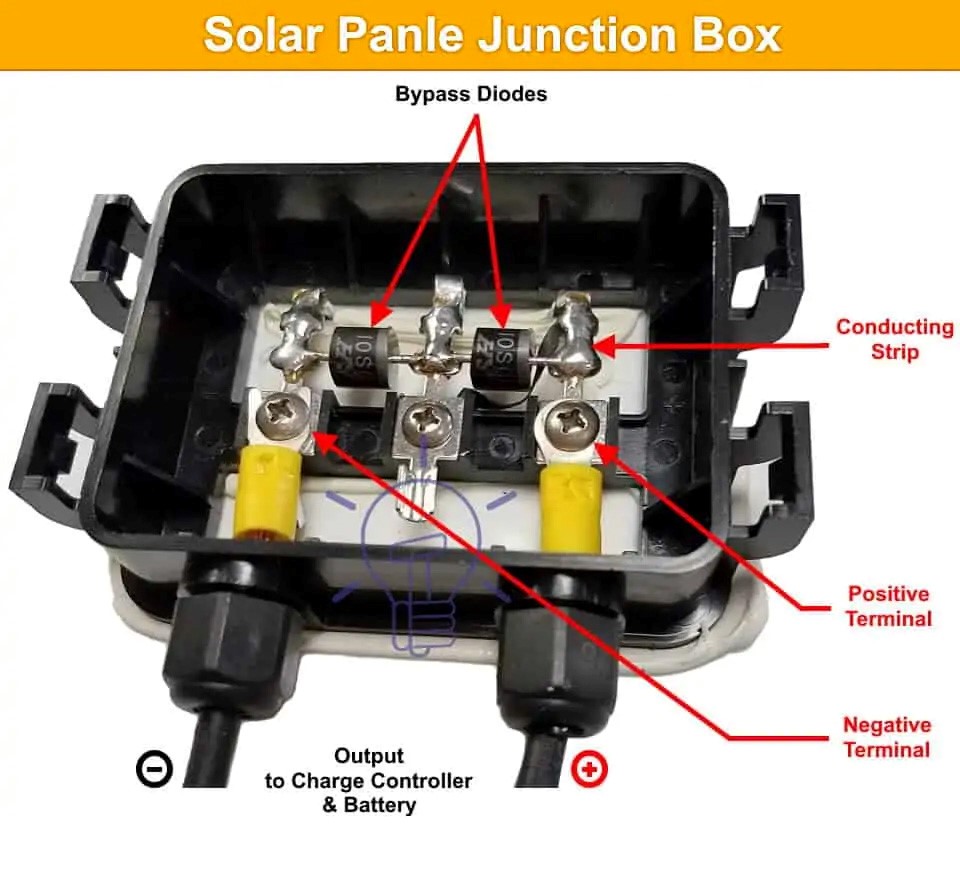
Electrical Malfunctions:
Below-par electrical components and unprofessional installations can lead to electrical malfunctions. Such situations occur due to loose connections, damaged cables, or defective inverters. These problems can cause short circuits in panels’ wiring which eventually can start a fire.
Arcing and Overheating:
Arcing refers to electrical discharges between conductors. Faults in the wiring or damaged insulation are the leading cause of this problem. Arcing can generate intense heat, and if it comes into contact with any flammable materials, it can lead to fires.
Manufacturing Defects:
Occasionally, manufacturing defects in solar panels or their components can lead to fire hazards. These defects may include substandard materials, improper wiring, or inadequate insulation. These problems can increase the likelihood of electrical malfunctions and fires.
Poor Maintenance:
Lack of regular inspections, cleaning, and maintenance can increase the risk of solar panel fires. Accumulation of dust, debris, or vegetation on panels can hinder their performance and cause overheating. Delays in identifying and addressing these potential issues can lead to solar panel fires.
External Factors:
Solar panels have to withstand various external factors, including extreme temperatures, lightning strikes, and hailstorms. These events can cause damage to the solar PV modules or their electrical components.
Defective Connection:
A primary factor that can cause fire outbreaks in solar panels is a defective junction box. The junction box connects the electrical cables to the solar panel. If the junction box is of poor quality or has improper wiring, it can lead to overheating and result in a fire. To prevent this, it is crucial to regularly check and maintain the solar panels.
Other Possible Reasons:
Besides the defective junction box, there are other reasons which can cause solar panel fires. Problems like poorly designed systems, including inadequate component selection or unprofessional system sizing, can lead to fire hazards. Faulty products, such as substandard panels or components, can also be the reason of fire incidents. Issues like over-voltage, power surges, or lightning strikes can further exacerbate the risk of fires in solar panels.
It is important to recognize that solar PV systems have live wires with electricity. Therefore, correct procedures must be followed during the installation process. Steps like using appropriate wires and making sure that they have adequate insulation are essential to prevent fire risks. Problems like short circuits, arc faults, reverse currents, and ground faults can occur without proper insulation.
It is important to note that solar fires are relatively rare. However, understanding the causes and taking preventive measures are crucial to minimize the risk of fires in solar PV modules.

Preventive Measures for Solar Panel Fires:
To ensure the safety of your solar installation, the following preventive measures should take into account:
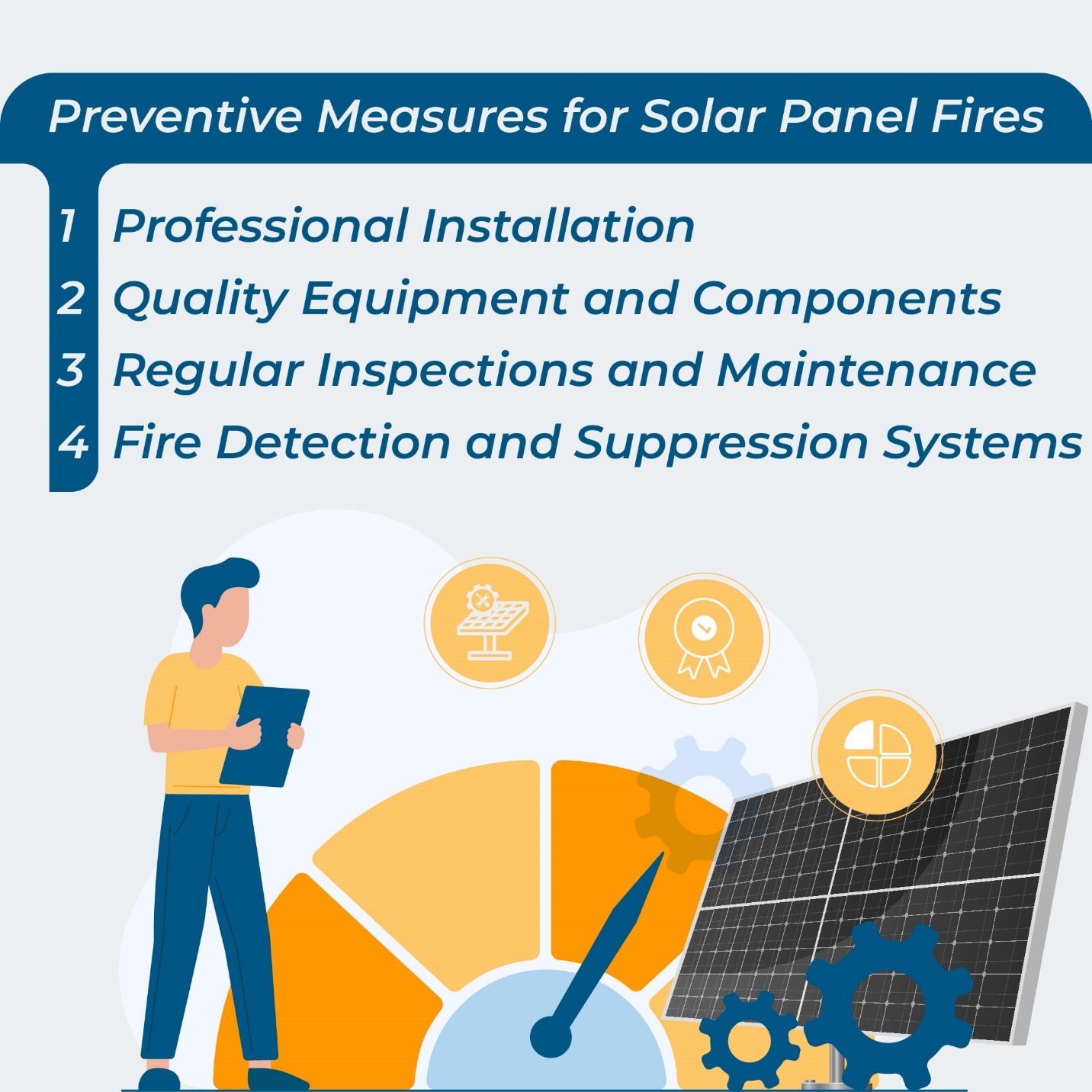
1. Professional Installation:
Certified and experienced solar panel installers like Solar SME can make the solar installation more safe and reliable. Professionals understand local codes and regulations and can ensure the installation procedure is carried out correctly. They also have the expertise to identify potential fire hazards and take appropriate measures during the installation process.
2. Quality Equipment and Components:
Investing in high-quality solar panels, inverters, connectors, and cables from reputable manufacturers is paramount. Use of quality equipment help to withstand rigorous operating conditions and undergo stringent safety testing. Choosing quality components can significantly reduce the risk of electrical malfunctions and subsequent fires.
3. Regular Inspections and Maintenance:
Regular inspections by qualified professionals are essential to identify any potential issues. These inspections can involve both the electrical and the structural components of the solar panels. Regular maintenance, including cleaning panels and inspecting the wiring for signs of wear or damage, can ensure optimal system performance and hence reduce fire risks.
4. Fire Detection and Suppression Systems:
Consider integrating fire detection and suppression systems into your solar panel setup. These systems can quickly detect fires and activate appropriate measures, such as automated shutdowns or the release of extinguishing agents in order to minimize damage. Consult with professionals specializing in solar panel fire to determine the most suitable fire detection and suppression systems for your installation.
Key Considerations for Solar Panel Safety:
In addition to preventive measures, there are several important things you need to consider for a safe solar panel installation:
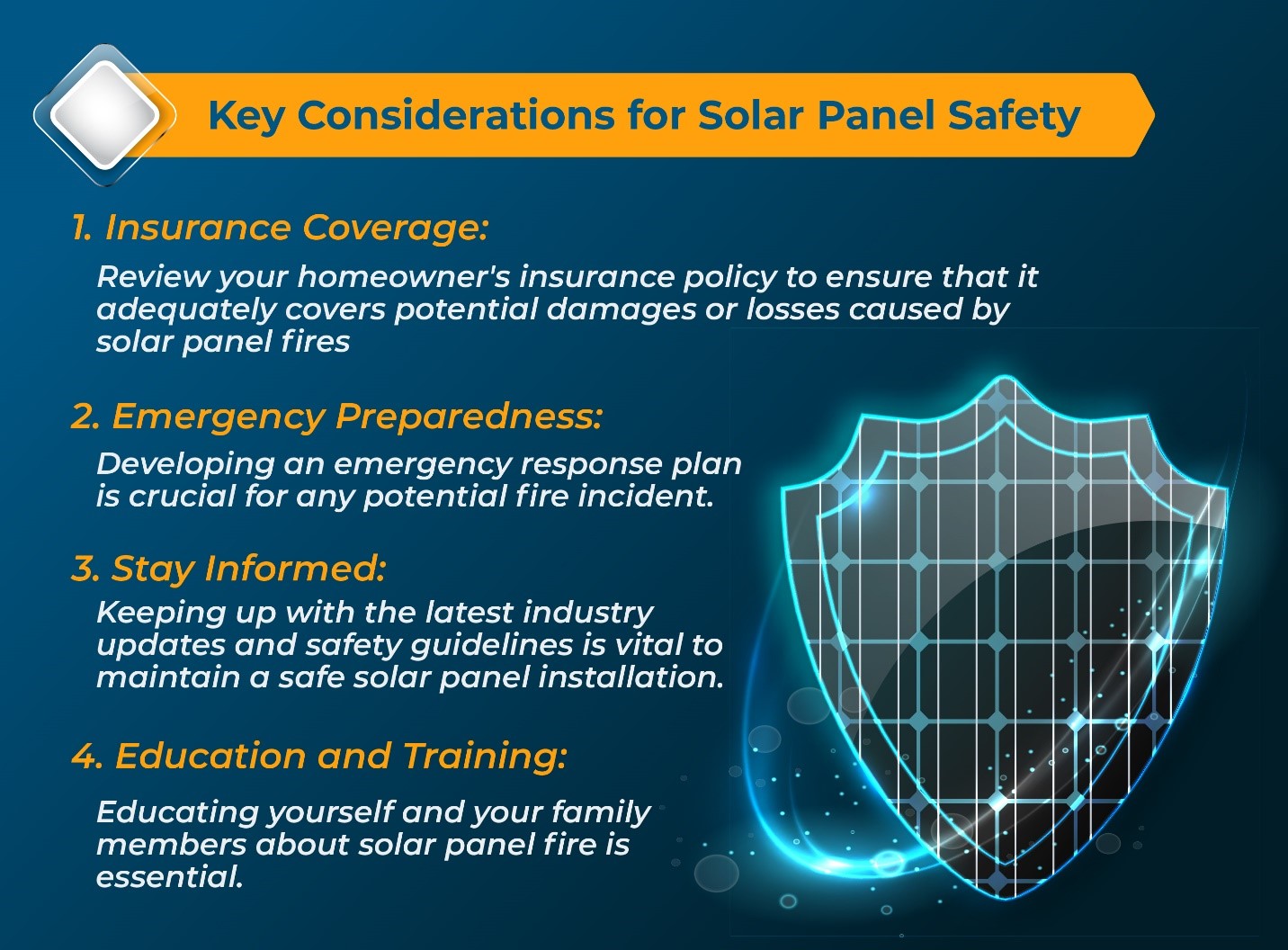
1. Insurance Coverage:
Review your homeowner’s insurance policy to ensure that it adequately covers potential damages or losses caused by solar panel fires. Standard homeowner’s insurance policies typically cover fire incidents, but it is essential to verify if solar fires are explicitly included in your policy. If necessary, consider adding coverage options specific to solar energy systems. Contact your insurance provider to discuss your options and ensure that you have comprehensive protection against solar fires.
2. Emergency Preparedness:
Developing an emergency response plan is crucial for any potential fire incident. Ensure that you are familiar with the process of contacting emergency services in your area and communicate any specific details regarding your solar panel installation. Additionally, understand the system shutdown procedures and locate the electrical disconnects or shutdown switches. This information can help you act swiftly and minimize potential risks during emergency situations.
3. Stay Informed:
Keeping up with the latest solar industry updates and safety guidelines is vital for safe solar panel installation. Stay informed about new technology, best installation procedures, and safety standards by reputable sources such as the National Fire Protection Association (NFPA) and local building authorities. These resources offer valuable insights into emerging safety concerns. Regularly review and implement any recommended safety measures to ensure the safety and reliability of your solar panel system.
4. Education and Training:
Educating yourself and your family members about solar panel fire safety is essential. Ensure everyone in your household understands the basics of solar panel operations and potential risks. Educate them on what to do in case of a fire. These include evacuation procedures, emergency contacts, and safe distances from the solar panel installation during a fire. Consider attending workshops or training sessions on solar panel safety to deepen your knowledge and understanding of this topic.
Photovoltaic Solar Panels and House Fires
PV systems may be a fire hazard, especially if firefighters are unaware that a solar system is installed in the house. Some of these hazards are:
- The conduit from panels to an inverter may remain active with direct current, even after the main server of the solar panels has shut down. As a result, firefighters may unknowingly touch live lines making them vulnerable to electrical shock. Some may carry a hot stick to aid them in finding live wires, but this does not detect direct currents.
- Solar panels and batteries contain lethal chemicals. These can be dangerous to human health.
- PV modules are slippery and pose a slip-and-fall risk to technicians, inspectors, and firefighters.
- Solar panels may block main points and pathways that firefighters would use to mount, navigate and dismount from a roof.
- PV modules may inhibit the ventilation of a fire in prime roof locations.
- If the structure’s integrity is already compromised by fire, the extra weight of a solar panel array may lead to roof collapse.
Importance of National Electric Code
The ability of firefighters to effectively control a house fire is a significant concern for many citizens. However, it is important to note that firefighters are trained to deal with unique challenges posed by fires.
To address the concerns of citizens, the National Electric Code, which is adopted widely across all 50 states, needs to be implemented in letter and spirit. This code includes provisions that mandate the automatic shutdown of solar inverters. National Electric code serves as a crucial standard for safe electrical design and installation, prioritizing the protection of first responders and enabling them to work safely around solar systems.
Furthermore, building codes also reflect the importance of firefighter safety. These codes ensure that enough space is available on the rooftop for firefighters to maneuver around solar panels. These codes provide guidelines to ensure that firefighters can navigate the rooftop effectively during fire suppression operations.
Creating a Safe Environment for Firefighters
The solar industry, like any other industry, is actively engaged in creating a safer environment for firefighters to carry out their work. Through adherence to codes, regulations and training, safety of firefighters can be ensured.
Moreover, by fostering open communication and collaboration between solar industry professionals and firefighting agencies, we can continue to identify and implement best practices that promote the safety of firefighters while effectively addressing fires in buildings with solar installations.
Conclusion:
In conclusion, the increasing number of solar panel fires cases in New South Wales (NSW) highlights the importance of understanding and mitigating the risks associated with solar installations. The occurrence of fires is primarily associated with DC arc faults, where high-voltage DC creates an arc that eventually leads to fire risks. Monitoring for arc faults, conducting regular inspections, and addressing equipment failures are essential in preventing these incidents.
Additionally, the faulty DC isolator, designed to enhance safety, ironically can become a potential source of fire in solar panels. Incorporating Rapid Shutdown functionality and advanced safety features in solar systems can improve their safety. Collaboration between solar system owners, installers, and firefighters can be crucial to ensure that the safety protocols are in place. By prioritizing safety measures and staying informed about potential fire risks, we can minimize the occurrence of solar panel fires.
Related Articles:
Hail damage is one of the main concerns for customers considering installing home solar panels in the United States. Luckily, solar panels have a long lifespan.
Although solar panels are designed to withstand harsh weather conditions like storms, hurricanes, and hail, however, their power generation may significantly vary depending on the environment. Explore how weather impacts on your system performance.
Solar insurance gives homeowners extra assurance that the system they invested in will produce energy as expected. Here’s a guide to everything else it does.


